| Srl | Item |
| 1 |
ID:
154078
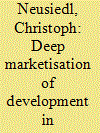

|
|
|
|
|
| Summary/Abstract |
This article introduces the concept of ‘deep marketisation’ as a relatively new, contemporary phase of neoliberal development policy in Bangladesh. By looking into the development strategy of the country’s energy sector, the article shows how an emphasis on marketisation through public-private partnerships (PPPs) and other strategies advances a market fundamentalist agenda to strengthen the private sector and establish a world market. By drawing on interviews with development practitioners from various development organisations in Bangladesh, the article further reveals how development conceptualisations are shaped by the strategy of deep marketisation, leading to the impoverishment of development by constraining its field of actions to measures based on the primacy of economic growth and private sector-led economic development, at the same time leading to a re-legitimisation of flawed neoliberal development policies that result in further inequality, poverty and environmental degradation.
|
|
|
|
|
|
|
|
|
|
|
|
|
|
|
|
| 2 |
ID:
144253
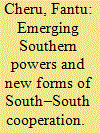

|
|
|
|
|
| Summary/Abstract |
This article critically examines Ethiopia’s engagement with China and India. Despite being a non-oil exporting country, Ethiopia has become one of the fastest growing economies in Africa and, over the past decade, millions of people have been lifted out of poverty. Part of Ethiopia’s success has been the ability of the developmental state to harness its relationship with the new as well as the traditional development partners strategically, to unleash the country’s productive potential while maintaining national policy space. Ethiopia’s pragmatic ‘economic diplomacy’ arose from the desire of the liberation movements that formed the umbrella Ethiopian People’s Revolutionary Democratic Front (EPRDF) to fundamentally transform all aspects of Ethiopian society and to break out of poverty, which the EPRDF considers a ‘national shame’ and a handicap to the country’s ability to define foreign and development policies independently. The Ethiopian experience challenges the school of thought that equates the rise of emerging powers in Africa with a new form of ‘colonialism’, disregarding African agency to transform these relationship into ‘win-win’ partnerships.
|
|
|
|
|
|
|
|
|
|
|
|
|
|
|
|
| 3 |
ID:
144275
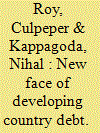

|
|
|
|
|
| Summary/Abstract |
Developing country debt has been a major preoccupation for development policy makers and practitioners since the debt crisis of 1982. It is a major obstacle to economic and social progress in developing countries. After the resolution of the Asian financial crisis of the late 1990s and the debt relief initiatives for low-income countries of 1997–2006 concerns about developing country debt seem to have receded. However, there are a growing number of problems that warrant concern, including the accumulation of domestic debt, short-term debt and private non-guaranteed debt, and increasing recourse by low-income countries to international capital markets. At the same time developing countries have strengthened their capacity to oversee and analyse their debt portfolios. Nonetheless, significant weaknesses remain in debt management capacity at the national level. Moreover, the activities of ‘vulture funds’ and the lack of a sovereign debt restructuring mechanism reveal major shortcomings in the international institutional architecture that need to be addressed urgently.
|
|
|
|
|
|
|
|
|
|
|
|
|
|
|
|
| 4 |
ID:
144256
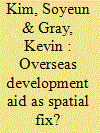

|
|
|
|
|
| Summary/Abstract |
This paper examines the extent to which South Korea’s developmental aid programme to Africa can be understood as a form of ‘aid as imperialism’. We argue against the depiction of a crude determinism between the ‘interests of capital’ and the international activism of the South Korean state through aid provision. Drawing on Harvey’s theory of the new imperialism, we argue that, while the structural transformations in the South Korean political economy explain Seoul’s ODA programme at a general level, it is strongly influenced by geopolitical objectives which often undermine South Korea’s ability to pursue distinctly mercantile aims.
|
|
|
|
|
|
|
|
|
|
|
|
|
|
|
|
| 5 |
ID:
151487
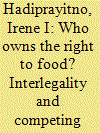

|
|
|
|
|
| Summary/Abstract |
Economic globalisation has transformed the politics of realising the right to food. This article aims to discuss the extent to which competing as well as conjoined interests in agricultural modernisation reconfigure the right to food as actors, norms and practices change. Drawing upon the concept of interlegality, which considers dynamic perspectives of plural legal orders, the discussion focuses on, first, existing norms linked to the wider understanding of the right to food and, second, the interplay of interests supported by the state, corporations and civil society organisations. The Indonesian agricultural modernisation project in Papua is used as a case study.
|
|
|
|
|
|
|
|
|
|
|
|
|
|
|
|